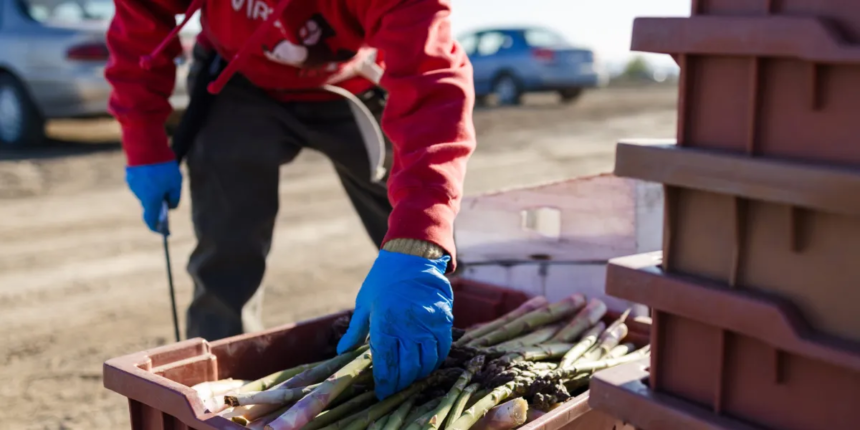SKANEATELES, N.Y. (AP) — Farmer Jeremy Brown taps the nose of a young calf. “I love the ones with the pink noses,” he says.
This pink-nosed animal is just one of about 3,200 cattle at Twin Birch Dairy in Skaneateles, New York. In Brown’s eyes, the cows on the farm aren’t just workers: “They’re the boss, they’re the queen of the barn.”
“Ruminants are the solution, not the problem, to climate change,” he said.
Wearing a weathered hoodie and a hat promoting a brand of cow medicine, Brown was spending a windy Friday morning artificially inseminating some of the farm’s massive Jerseys and Holsteins. He stepped over an electric manure scraper used to clean the animals’ barn.
The electric scraper means the dairy doesn’t have to use a fuel-burning machine for that particular job. Twin Birch also recycles manure for use on crops, cools its milk with water that gets recirculated for cows to drink and grows most of its own feed.
He raises a question many farmers have been asking: Is organic farming just a word?
The rules governing the National Organic Program were published in 2000, and in the years after, organic farming boomed to eventually reach more than 5 million acres. But that has been declining in recent years.
Any downward trend is significant, as organic farms make up less than 1% of the country’s total acreage, and organic sales are typically only a tiny share of the nationwide total.
It’s also just a tough business, Ratcliff said.
Her co-owner, Walter Adam, also thinks younger generations’ interest in farming of any kind is also declining.
“It takes six months to learn everything,” Adam said. “We can’t find anybody as willing to work on the farm.”
Adam drives to Manhattan each week to sell their meat and eggs at markets, and spends Sunday mornings helping Ratcliff with business at the Brighton Farmers Market in Brighton, New York.
Frank Mitloehner, a professor in animal science in the College of Agricultural and Environmental Sciences at University of California Davis, said lack of flexibility and efficiency are driving farmers away from organic in an era of rising prices for farmers. He said organic standards need to be overhauled or the marketplace risks organic going away completely.
“I am in awe that so many organic farmers were able to produce that way for that long,” he said. “It seems that they are losing consumer base in these financially troubling times.”
Still, there are consumers determined to buy organic. Aaron Swindle, a warehouse employee at a chain supermarket, spends every Sunday morning shopping for organic groceries at the Brighton Farmers Market.
“The taste quality is different when it’s growing nearby,” Swindle said. He calls the Finger Lakes of New York a “trifecta,” a region that contributes dairy, produce, and meat for its residents.
Bolton doesn’t use pesticides. On a chilly day this spring, he was at his greenhouse unloading 1,500 ladybugs to do the work of eliminating the operation’s aphids. That’s the kind of practice organic farms use to earn the certification, he said.
He said his operations aren’t immune to the dangers posed by climate change. Abnormally hot days affect their greenhouse, he said: “It’s devastating to not only the people but the plants.”
But Bolton described the organic certification as economically and environmentally beneficial to his farm. Getting the certification will carry an expense, but he is confident it will be worth the price.
“It helps with sales. And you feel good about it – you’re doing the right practices,” Bolton said.
___









